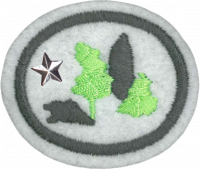Difference between revisions of "AY Honors/Shrubs - Advanced/Answer Key"
m (es,fr) |
|||
| Line 5: | Line 5: | ||
</noinclude> | </noinclude> | ||
<!-- 1. Have the Shrubs honor. --> | <!-- 1. Have the Shrubs honor. --> | ||
| − | {{honor_prerequisite | + | {{honor_prerequisite|honor=Shrubs}} |
<!--T:14--> | <!--T:14--> | ||
Latest revision as of 22:56, 14 September 2021
1
For tips and instruction see Shrubs.
2
This requirement covers two different concepts.
Ornamental Shrubs are any of a wide variety of shrubs selected for use in landscaping because of their pleasing look as opposed to shrubs that are grown primarily for a food source. Ornamental shrubs may have interesting flowers, leaves or bark or because they are generally visually appealing.
Some shrubs may be used in rows to create a good screen between land uses (for privacy, security, to hide an undesirable view or reduce sound transfer from a street). Shrubs are often planted in rows to delineate property lines, serving as a sort of living fence. Landscaping guidelines issued by cities for specific developments or planning zones often require a certain number of ornamental trees and shrubs per property or sq meter of landscaping.
Decorating your shrubs is a different idea. Some people like to put strings of lights on their shrubs, especially around Christmas. Perhaps in your area there are other customs that involve decorating shrubs for some special occasion.
3
You should go read up on the care of the specific shrub you plan to care for, but some general guidelines follow.
Shrubs just for landscaping do not generally need a lot of care, but if you are growing fruit or getting a new shrub established there are some things you should do including:
A) Variety selection - selecting a shrub that will grow well in your climate and give you the fruit or flowers you want is important
B) Soil preparation and fertilizer
C) Ensure the shrub has adequate or an appropriate amount of water and appropriate drainage
D) Inspect for pests and be prepared to spray or take other action against harmful pests that may destroy your crop.
E) Pruning shrubs concentrates the plant's effort into the remaining good branches. It help light get to the right places and prevents the shrub from getting unwieldy
F) At the appropriate time you should harvest the fruit or pick some flowers and give them away to brighten someone's day.
We refer you to the Small Fruit Growing honor for additional guidance if you are caring for a fruit bearing shrub. Why not earn these honors together?
4
4a
This is similar to Requirement 3 in the basic honor. These shrubs grow in many areas. The table below indicates where the plants grow in the wild, and where they are cultivated. This can be a starting point for your investigation of what grows in your area.
| Shrub | Wild | Cultivated |
|---|---|---|
| Azalea | North America, Asia, Europe, Australia | Worldwide |
| Clematis | Temperate Zones, Worldwide | Temperate Zones, Worldwide |
| Forsythia | Asia, Europe | North America |
| Hibiscus | Worldwide | Worldwide |
| Lilac | Europe, Asia | Worldwide |
| Mountain Laurel | Eastern North America |
4b
Similar to Requirement 2 in the basic honor. Some important fruit shrubs include:
- Grape
- Highbush blueberry
- Lowbush blueberry
- Blackberry
- Raspberry
- Mulberry
- Cranberry
- Fig
- Pomegranate
- Kumquat
- Guava
- Red Currant
- Black Currant
- Gooseberry
- Juneberries
- Serviceberry
- Elderberry
Even if people do not eat the food these shurbs provide, they are an important source of food for wildlife.
5
This is simply a longer observation period for Requirement 7 of the Shrubs honor. See the guidance there.
See the Insects honor for tips on identifying the insects you observe (and consider earning the Insects honor while you're at it).
6
We don't know what area you live in, but consult the list of food shrubs under Requirement 4b for some possibilities. You might consider what shrubs are farmed in your area and what wild shrubs provided food for native populations or current inhabitants.
7
This is an expansion of the final Shrubs honor requirement. Expand your collection.
Note on Availability
While this is a South American honor, there is no reason any Pathfinder can't earn it and show the accomplishment by adding an Advanced Honor star to the Shrub honor patch which is available worldwide.



